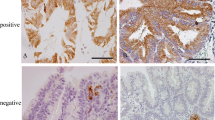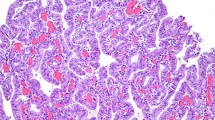Abstract
Background: Cathepsin D (CD) is an aspartyl lysosomal protease, and the prognostic value of CD expression has been studied in a variety of tumors, however, its role in early adenocarcinomas remains unclear.
Aim of the Study: We evaluated the expression of CD in a series of colorectal adenomas with severe dysplasia containing foci of early carcinoma and compared the results to several histopathological and immunohistochemical features.
Methods: Adenomas were obtained by endoscopic polypectomy from 33 patients. Twenty-four of the 33 adenomas contained well-differentiated adenocarcinomas and nine adenomas contained moderately differentiated adenocarcinomas.
Results: Positive CD expressions were observed in 25% of well-differentiated adenocarcinomas and in 66.7% of moderately differentiated adenocarcinomas (p<0.05). Of the 12 adenocarcinomas with positive CD expression, four had positive CD expression in their adenomas (p<0.01), 6 showed positive Ki-67 expression in their adenomas (NS), and 10 had positive p53 expression in their adenomas (p<0.05). No significant association was seen between the level of CD expression and adenoma size.
Conclusions: The expression of CD in adenocarcinoma correlated significantly with differentiation, and with the levels of CD and p53 expression in the adenomas of the polyp.
Similar content being viewed by others
References
Liotta LA. Tumor invasion and metastases: role of the basement membrane. Warner-Lambert Parke-Davis Award Lecture. Am J Pathol 1984;117:339–348.
Briozzo P, Morisset M, Capony F, et al. In vitro degradation of extracellular matrix with Mr 52,000 cathepsin D secreted by breast cancer cells. Cancer Res 1988;48:3688–3692.
Nazeer T, Malfetano JH, Rosano TG, Ross JS. Correlation of tumor cytosol cathepsin D with differentiation and invasiveness of endometrial adenocarcinoma. Am J Clin Pathol 1992;97:764–769.
Saku T, Sakai H, Tsuda N, et al. Cathepsins D and E in normal, metaplastic, dysplastic, and carcinomatous gastric tissue: an immunohistochemical study. Gut 1990;31:1250–1255.
Valentini AM, Pirrelli M, Armentano R, Caruso ML. The immunohistochemical expression of cathepsin D in colorectal cancer. Anticancer Res 1996;16:77–80.
Mayer A, Fritz E, Fortelny R, et al. Immunohistochemical evaluation of cathepsin D expression in colorectal cancer. Cancer Invest 1997;15:106–110.
Kanber Y, Demirbag NR, Sam AD, Aydin N. Cathepsin D expression in colorectal adenocarcinomas and adenomas. Int J Biol Markers 2002;17:165–168.
Japanese Society for Cancer of the Colon and Rectum. Pathological rules, in General Rules for Clinical and Pathological Studies on Cancer of the Colon, Rectum and Anus, 6th ed. Japan: Kanehara, Tokyo, 1998 (in Japanese).
Ioachim EE, Goussia AC, Machera M, et al. Immunohistochemical evaluation of cathepsin D expression in colorectal tumours: a correlation with extracellular matrix components, p53, pRb, bcl-2, c-erbB-2, EGFR and proliferation indices. Anticancer Res 1999;19:2147–2155.
Sedivy R, Wolf B, Kalipciyan M, et al. Genetic analysis of multiple synchronous lesions of the colon adenomacarcinoma sequence. Br J Cancer 2000;82:1276–1282.
Yao T, Kajiwara M, Kouzuki T, et al. Villous tumor of the colon and rectum with special reference to roles of p53 and bcl-2 in adenoma-carcinoma sequence. Pathol Int 1999;49:374–382.
Saleh HA, Jackson H, Khatib G, Banerjee M. Correlation of bcl-2 oncoprotein immunohistochemical expression with proliferation index and histopathologic parameters in colorectal neoplasia. Pathol Oncol Res 1999;5:273–279.
Kikuchi Y, Dinjens WN, Bosman FT. Proliferation and apoptosis in proliferative lesions of the colon and rectum. Virchows Arch 1997;431:111–117.
Johnston PG, O’Brien MJ, Dervan PA, Carney DN. Immunohistochemical analysis of cell kinetic parameters in colonic adenocarcinomas, adenomas, and normal mucosa. Hum Pathol 1989;20:696–700.
Mosnier JF, Perret AG, Vindimian M, et al. An immunohistochemical study of the simultaneous expression of bcl-2 and p53 oncoproteins in epithelial tumors of the colon and rectum. Arch Pathol Lab Med 1996;120:654–659.
Hamana T, Kawai K, Serizawa A, et al. Immunohistochemical demonstration of p53 protein in colorectal adenomas and adenocarcinomas. Reliable application of the heat-induced antigen retrieval method to formalin-fixed, paraffin-embedded material. Pathol Int 1994;44:765–770.
Ohue M, Tomita N, Monden T, et al. A frequent alteration of p53 gene in carcinoma in adenoma of colon. Cancer Res 1994;54:4798–4804.
Darmon E, Cleary KR, Wargovich MJ. Immunohistochemical analysis of p53 overexpression in human colonic tumors. Cancer Detect Prev 1994;18:187–195.
Sheahan K, Shuja S, Murnane MJ. Cysteine protease activities and tumor development in human colorectal carcinoma. Cancer Res 1989;49:3809–3814.
Tumminello FM, Gebbia N, Pizzolanti G, et al. Cathepsin D content in colorectal cancer. Correlation with cathepsin D activity and other biological parameters: a preliminary report. Oncology 1995;52:237–242.
Mayer A, Fritz E, Fortelny R, et al. Immunohistochemical evaluation of cathepsin D expression in colorectal cancer. Cancer Invest 1997;15:106–110.
Arao J, Fukui H, Ono Y, et al. Immunohistochemical localization of cathepsin D in colorectal tumors. Dis Colon Rectum 2000;43:396–401.
Harris GJ, Senagore AJ, Lavery IC, et al. Factors affecting survival after palliative resection of colorectal carcinoma. Colorectal Dis 2002;4:31–35.
Geraghty JM, Williams CB, Talbot IC. Malignant colorectal polyps: venous invasion and successful treatment by endoscopic polypectomy. Gut 1991;32:774–778.
Bertorelle R, Esposito G, Del Mistro A, et al. Association of p53 gene and protein alterations with metastases in colorectal cancer. Am J Surg Pathol 1995;19:463–471.
Author information
Authors and Affiliations
Corresponding author
Rights and permissions
About this article
Cite this article
Kunimura, T., Inagaki, T., Wada, M. et al. Immunohistochemical evaluation of tissue-specific proteolytic enzymes in adenomas containing foci of early carcinoma. Int J Gastrointest Canc 33, 149–154 (2003). https://doi.org/10.1385/IJGC:33:2-3:149
Issue Date:
DOI: https://doi.org/10.1385/IJGC:33:2-3:149




